Book contents
- Frontmatter
- Contents
- Acknowledgements
- Can We Live Forever?
- Chapter One Longevity and the Population Debate
- Chapter Two The Social Utopia of Human Perfection
- Chapter Three Ancient and Modern Techniques of Longevity
- Chapter Four The Political Economy of Ageing
- Chapter Five The Moral and Spiritual Character of Old Age
- Chapter Six Vulnerability and the Ethic of Care
- Chapter Seven Towards a New Paradigm of Ageing
- Chapter Eight The Aesthetics of Ageing
- Bibliography
- Index
Chapter Two - The Social Utopia of Human Perfection
Published online by Cambridge University Press: 05 March 2012
- Frontmatter
- Contents
- Acknowledgements
- Can We Live Forever?
- Chapter One Longevity and the Population Debate
- Chapter Two The Social Utopia of Human Perfection
- Chapter Three Ancient and Modern Techniques of Longevity
- Chapter Four The Political Economy of Ageing
- Chapter Five The Moral and Spiritual Character of Old Age
- Chapter Six Vulnerability and the Ethic of Care
- Chapter Seven Towards a New Paradigm of Ageing
- Chapter Eight The Aesthetics of Ageing
- Bibliography
- Index
Summary
Introduction: The Tithonus Fallacy
In his The Living End, Guy Brown (2008) effectively calls to mind a Greek myth – the story of Tithonus – to frame the debate about whether we can live longer lives and cure the geriatric diseases and disabilities that currently affect later life. In Greek mythology, Tithonus, a mortal, falls in love with Eos, the goddess of dawn. Realizing that Tithonus must die eventually, she asks Zeus to grant her lover immortality. Zeus, who is a jealous god, grants Eos's wish, but literally so. While Tithonus enjoys immortality, he does not also enjoy eternal youth. As Tithonus becomes old and decrepit, he also becomes demented and a burden. Driven to despair by his senile babbling, Eos turns her decaying lover into a cicada whose endless chirruping provides a parody of the babbling of the ageing Tithonus. The claim of contemporary immortalism is that medical science can ultimately grant us both immortality and eternal youth. By contrast, critics of medical science are allegedly committing the Tithonus fallacy of assuming that living forever is not desirable since senility will inevitably accompany longevity. Immortalists argue that people with the benefits of prolongevity can also be youthful, live fulfilling and happy lives and enjoy the benefits of continuous employment and social participation. In the short term, these claims look utopian since, in old age, people, as a matter of fact, do accumulate disease and disability.
- Type
- Chapter
- Information
- Can We Live Forever?A Sociological and Moral Inquiry, pp. 27 - 42Publisher: Anthem PressPrint publication year: 2009



